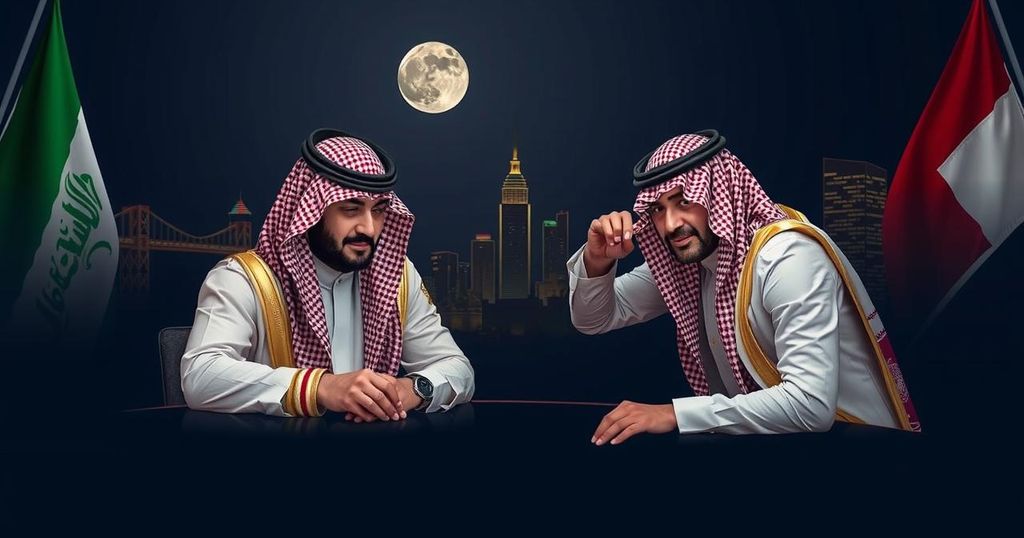David Barnea, the Mossad chief, is visiting Qatar to discuss a ceasefire and prisoner exchange regarding the ongoing conflict in Gaza. This comes as tensions rise within the region, particularly between Israel and Iran. The US is actively involved in facilitating the talks, with significant implications for regional stability.
CAIRO – 27 October 2024: David Barnea, the Director of Mossad, is scheduled to arrive in Doha, the capital of Qatar, on Sunday to reengage in discussions aimed at establishing a ceasefire and facilitating a prisoner release agreement in Gaza. This diplomatic mission is occurring amidst heightened tensions in the region, as the United States amplifies its efforts to bolster the indirect negotiations between Hamas and Israel, particularly in light of the recent assassination of Hamas leader Yahya Al-Sinwar in mid-October. Expectations surrounding the renewal of ceasefire discussions are significant, and reports suggest a potential meeting between Director Barnea and William Burns, the CIA Director, in Qatar this week. The negotiating team from Qatar will be led by Prime Minister Mohammed bin Abdulrahman Al Thani, signaling a formal engagement in mediating the talks. However, Hamas’s involvement in these discussions remains uncertain, despite recent indications of their engagement in talks facilitated by Egypt in Cairo to address obstacles to reaching a ceasefire. As the conflict in Gaza approaches its second year, increasing military confrontations have been noted, particularly in Lebanon, where Israeli forces have conducted extensive attacks, resulting in substantial civilian casualties across the region. These dual conflicts have culminated in tens of thousands of reported fatalities, amplifying international concerns about a broader war erupting in the region, particularly in light of escalating exchanges of hostilities between Iran and Israel. On Saturday, Israel conducted three strikes against military targets in Iran as retaliation for an Iranian missile attack on Israel earlier in October. The United States has called for the cessation of retaliatory actions but has reiterated its commitment to defend Israel against any Iranian retaliation. In contrast, Iran has reasserted its right to self-defense under international law, indicating a potentially dangerous escalation in military tensions. Since the onset of hostilities on October 7, 2023, Egypt, Qatar, and the United States have been at the forefront of mediating efforts between Israel and Hamas. Past negotiations facilitated the release of approximately 100 Israeli captives in return for about 240 Palestinian prisoners in November. However, continued Israeli military actions have reportedly led to the deaths of several remaining captives in Gaza, amidst Israeli Prime Minister Benjamin Netanyahu’s insistence on safely returning all captives. Recently, the Israeli army confirmed recovering the bodies of six captives from tunnels within the Gaza enclave, highlighting the ongoing complexity of the situation.
The current diplomatic situation involving Israel, Hamas, and regional actors like Qatar and Egypt arises from prolonged hostilities that have persisted since October 2023. The conflict has seen significant casualties and geopolitical tension, particularly involving Iran. Mediation attempts by Egypt, Qatar, and the United States have been aimed at fostering a ceasefire and addressing the humanitarian concerns stemming from the warfare. The killing of key Hamas leadership, including Yahya Al-Sinwar, has shifted dynamics, heightening the urgency for a negotiated solution. The negotiations have seen intermittent successes, but ongoing military actions complicate the humanitarian landscape and peace efforts.
Director David Barnea’s visit to Qatar emphasizes the critical nature of ongoing mediation efforts aimed at achieving a ceasefire and securing the release of hostages in Gaza. Amidst alarming escalations in hostilities both in Gaza and in the broader region involving Iran and Lebanon, the stakes remain high for all involved parties. Continued international pressure, particularly from the United States, highlights the urgent need to de-escalate tensions and restore a semblance of stability in a deeply fragmented situation. This visit symbolizes not only Israel’s commitment to engaging diplomatically but also the broader implications for peace in the region.
Original Source: www.egypttoday.com







